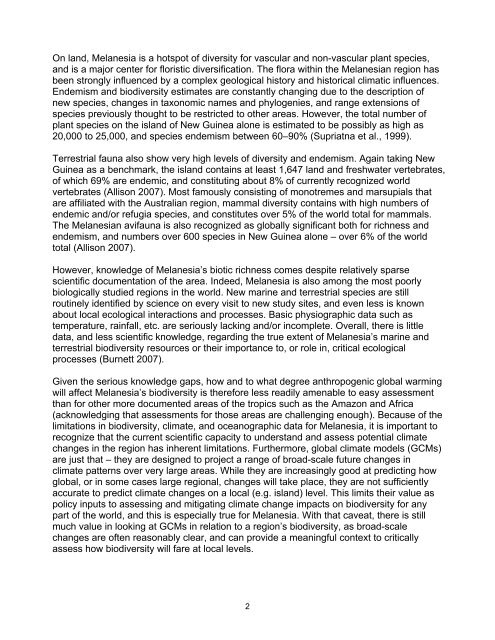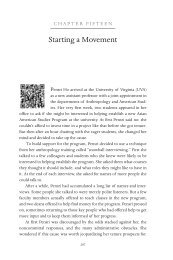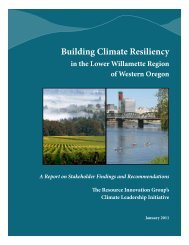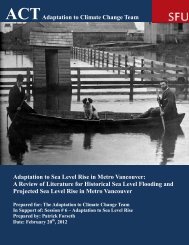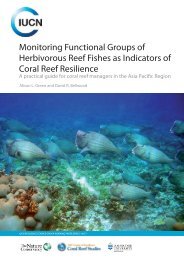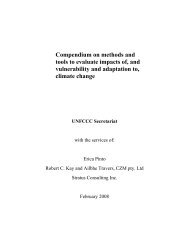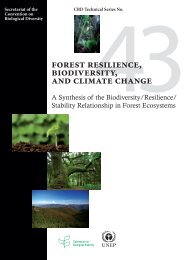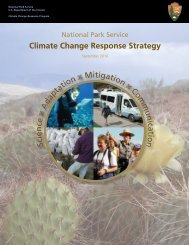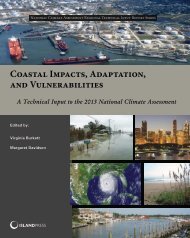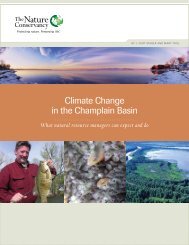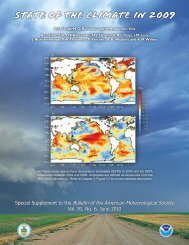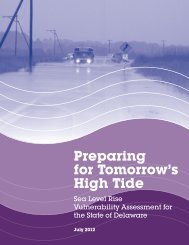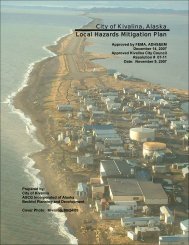What do we know? - Climate Adaptation Knowledge Exchange
What do we know? - Climate Adaptation Knowledge Exchange
What do we know? - Climate Adaptation Knowledge Exchange
- No tags were found...
Create successful ePaper yourself
Turn your PDF publications into a flip-book with our unique Google optimized e-Paper software.
On land, Melanesia is a hotspot of diversity for vascular and non-vascular plant species,and is a major center for floristic diversification. The flora within the Melanesian region hasbeen strongly influenced by a complex geological history and historical climatic influences.Endemism and biodiversity estimates are constantly changing due to the description ofnew species, changes in taxonomic names and phylogenies, and range extensions ofspecies previously thought to be restricted to other areas. Ho<strong>we</strong>ver, the total number ofplant species on the island of New Guinea alone is estimated to be possibly as high as20,000 to 25,000, and species endemism bet<strong>we</strong>en 60–90% (Supriatna et al., 1999).Terrestrial fauna also show very high levels of diversity and endemism. Again taking NewGuinea as a benchmark, the island contains at least 1,647 land and freshwater vertebrates,of which 69% are endemic, and constituting about 8% of currently recognized worldvertebrates (Allison 2007). Most famously consisting of monotremes and marsupials thatare affiliated with the Australian region, mammal diversity contains with high numbers ofendemic and/or refugia species, and constitutes over 5% of the world total for mammals.The Melanesian avifauna is also recognized as globally significant both for richness andendemism, and numbers over 600 species in New Guinea alone – over 6% of the worldtotal (Allison 2007).Ho<strong>we</strong>ver, <strong>know</strong>ledge of Melanesia’s biotic richness comes despite relatively sparsescientific <strong>do</strong>cumentation of the area. Indeed, Melanesia is also among the most poorlybiologically studied regions in the world. New marine and terrestrial species are stillroutinely identified by science on every visit to new study sites, and even less is <strong>know</strong>nabout local ecological interactions and processes. Basic physiographic data such astemperature, rainfall, etc. are seriously lacking and/or incomplete. Overall, there is littledata, and less scientific <strong>know</strong>ledge, regarding the true extent of Melanesia’s marine andterrestrial biodiversity resources or their importance to, or role in, critical ecologicalprocesses (Burnett 2007).Given the serious <strong>know</strong>ledge gaps, how and to what degree anthropogenic global warmingwill affect Melanesia’s biodiversity is therefore less readily amenable to easy assessmentthan for other more <strong>do</strong>cumented areas of the tropics such as the Amazon and Africa(ac<strong>know</strong>ledging that assessments for those areas are challenging enough). Because of thelimitations in biodiversity, climate, and oceanographic data for Melanesia, it is important torecognize that the current scientific capacity to understand and assess potential climatechanges in the region has inherent limitations. Furthermore, global climate models (GCMs)are just that – they are designed to project a range of broad-scale future changes inclimate patterns over very large areas. While they are increasingly good at predicting howglobal, or in some cases large regional, changes will take place, they are not sufficientlyaccurate to predict climate changes on a local (e.g. island) level. This limits their value aspolicy inputs to assessing and mitigating climate change impacts on biodiversity for anypart of the world, and this is especially true for Melanesia. With that caveat, there is stillmuch value in looking at GCMs in relation to a region’s biodiversity, as broad-scalechanges are often reasonably clear, and can provide a meaningful context to criticallyassess how biodiversity will fare at local levels.2


